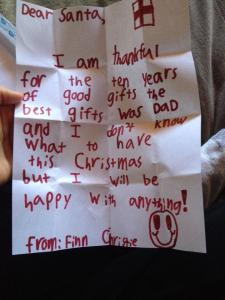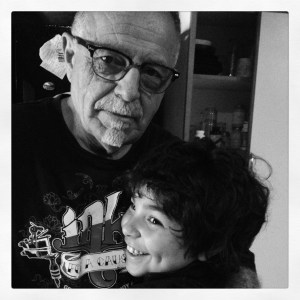by Debra Muzikar
“Not everyone’s perfect. There’s an imperfect side to everyone.” Finn Christie, age 10, on making perfect babies genetically.

I was at the print shop in Ventura last week printing cards when in walks George Christie, an “infamous” Ventura icon. My friend Linda, the author of Unintentional Humor, recognizes him and introduces us.
“This is George. He was President of the Hell’s Angels in Ventura. I met him at the Art of Autism event at Bell Arts,” she says.
George is a charismatic man in his sixties.
“They showed a documentary about me last weekend at Bell Arts,” George says. George was referring to the new documentary “The Last American Outlaw.”
I wondered why George would have been at Bell Arts Factory for The Art of Autism exhibit, then it hit me.
“Your son showed in our exhibit, didn’t he? He had an image of a person behind bars.”

“Yea, that’s Finn. That was me he drew behind bars. I’m going into prison for I hope only four months. I had three consecutive life sentences but I got it reduced.”
“Finn is quite a kid,” George continues. “He didn’t start talking until he was five years old. He’s really angry about the Swedes wanting to make super humans.”
The idea of a ten-year old being concerned about genetic research intrigued me and became the impetus for this blog. Many in the autism community believe too much funding goes to genetic research and not enough to those who are living. I believe if we focus on cures, our children come to believe they are broken and need to be fixed.
Here’s a video of Finn talking about what’s wrong with creating perfect babies.
I arranged an interview with Finn’s mom, Nikki, an attractive, vibrant hair stylist in Ventura.
Nikki brought along some videos and paintings that Finn had drawn and told me their story. George went into prison last weekend and she expresses sadness about her grandfather dying on Wednesday.
“We’re such a family unit. It’s been a difficult week,” she confides.
George and Nikki have been together for over fifteen years. George adopted Nikki’s daughter Aubree, who is now twenty, when she was six.
Finn was a typical toddler until around 18-months after his vaccinations. Nikki doesn’t know if there is a correlation with the vaccines, but expresses concern. After 18 months, Finn started having meltdowns, lost his words, walked on tip toe, flapped, lined up things, and didn’t want to be touched. The change was dramatic.
Not long after, he received a diagnosis of autism. The diagnosis was very difficult for George and Nikki. Nikki is outgoing and wanted to talk to friends about it; George at first was hesitant about revealing Finn’s diagnosis.
Finn received early intervention services. At age three, he was mostly nonverbal. He didn’t start talking in complete sentences until he was five.
“Charter School was good in that it helped him with his social skills,” Nikki says. “It didn’t provide enough structure, though. We’ve had to learn to structure everything for Finn.”
Finn is now in a Special Education class and has recently learned to read.
“He now reads at a second grade level,” she says. “The school provides a lot of structure and he’s made great progress.” Finn is in fifth grade and Nikki is concerned about the transition into Middle School next year.
“He’s a sensitive kid,” she says. “He’s very upset that his dad is in prison because he knows that his dad is taking the rap for others. George was set-up,” Nikki says.

Nikki and Finn are able to email George and they communicate daily. Finn emailed his dad yesterday that it felt “empty” in the house without him.
“George is a very involved dad. Every morning he makes Finn breakfast and his sack lunch,” she shares.
Nikki talks about George’s decision to leave the Hell’s Angels.
“One day when Finn was seven, he came home and said he was Prince of the Hell’s Angels and asked his dad if now he had to change and become angry and mad. It wasn’t the only reason George left the Hell’s Angels but it did hasten his decision to leave,” Nikki says. “Finn is so kind and sweet.”
George not only stepped down as President of the Hell’s Angels but left altogether.

Sometimes parents wonder whether to reveal to their child they’re autistic.
“I told Finn in second grade he had autism,” Nikki says. “He had a realization that he was different. At that time, he also had trouble looking people in the eye.”
Nikki relates how Finn said very profound things in second grade about people when looking them in the eye. “He said of a teacher that he sees sad and dark in her eyes. That’s why he couldn’t look at her.”
Finn now has no problem with eye contact.
When talking about therapies, Nikki shares what has worked for Finn.
“Finn is gluten-free. When he eats wheat his stomach bothers him. He’s sensitive to his own body. He takes Akido classes and acupuncture helps him. He wants to be an acupuncturist when he grows up,” she confides.
I share that acupuncture has also helped my son Kevin in the past.
Nikki has collected Finnisms – sayings unique to Finn.
“Does pet friendly hotel mean that hotels only accept pets that are friendly?”
“Does sex drive mean that people have sex when their driving and get into accidents?”
“Butter lettuce – I want butter on my lettuce.”
And probably the most profound,
“Maybe I don’t want to be normal. Normal people are weird and boring.”
Nikki says, “Finn is so deep people don’t understand him. Adults can appreciate what he says, but his peers have trouble.” Finn doesn’t have many friends right now. He likes to call himself a “Lone Wolf.” George and Nikki have reached out to a couple of peers and they go to the mall with Finn and play video games on Fridays.
Finn spoke at The Art of Autism event at Bell Arts Factory. We hope he’ll continue his art and will participate in the exhibit we’re having at the Future Horizons Temple Grandin conference on November 15 in Glendale.
Nikki shares Finn words to her the other day, “Mom, your love is so powerful.”
Wise words from a wise child.









Love this article. It helped me understand my grandson a little better. Robby has Aspbergers Syndrome, which is a form of autism. He’s brilliant in some areas….taught himself to read at two years old, can remember anything, etc. His problem is more with social skills. He’s been counseled all summer and that seems to have helped. He’s seven years old now. Thank you for sharing this. Hope all goes well while George is away. He’s sounds like such a great Dad. I met him in Sturgis around 1995 and he approached us and was so friendly and sociable. Praying he has a shorter sentence and can be back with his family soon.
It’s nice to see a boy who talks and acts much like my own son. These kids have a strong sense of fairness and I can see my own son taking issue with making perfect babies, perceiving this as not fair or right or even possible.